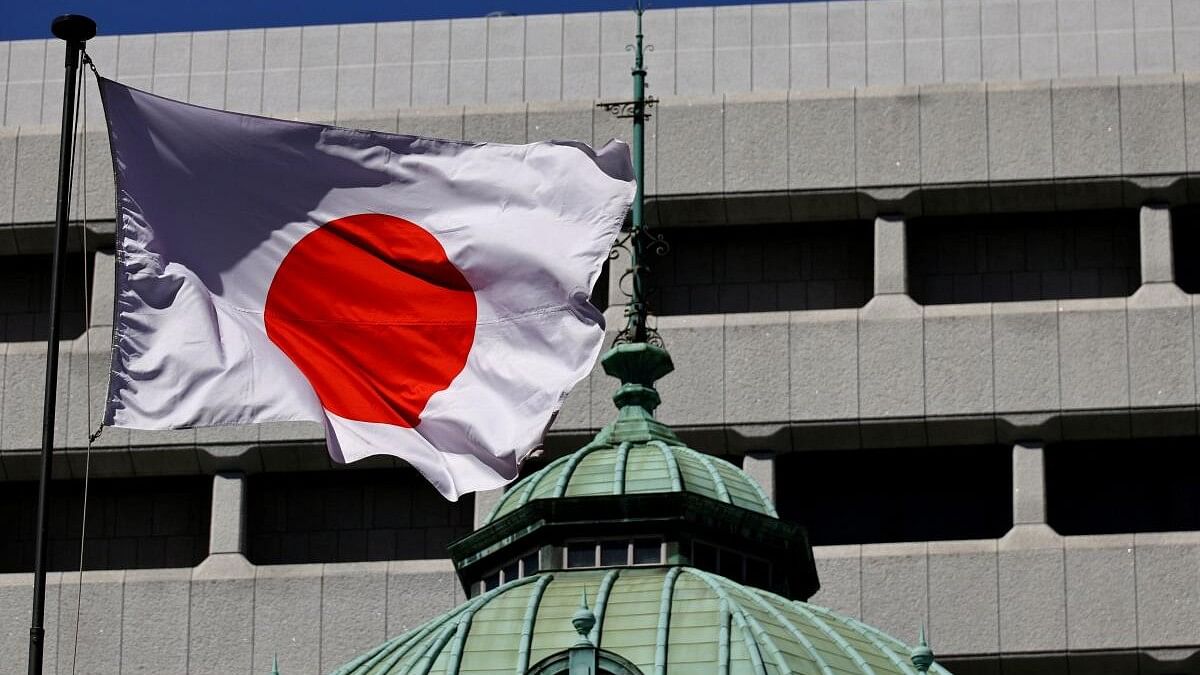
The Japanese national flag.
Credit: Reuters Photo
The Bank of Japan ended eight years of negative interest rates and other remnants of its unorthodox policy on Tuesday, making a historic shift away from a focus of reflating growth with decades of massive monetary stimulus.
Bart Wakabayashi of the Tokyo Branch Manager said, "It's a moment in history! But having said that, dollar/yen has only moved 30 points, so it's a classic 'buy the rumour, sell the fact'. I don't think the BOJ was going for the shock and awe approach this time."
"They are doing what they said they are going to do... essentially we're a normal country!"
"How does this impact households locally and their spending power - I think that's going to be the next big discussion and with an eye to that I don't think the BOJ can do anything beyond what they've announced."
Norihiro Yamaguchi, a senior economist at the Oxford Economics said, "There were no surprises so far. It's all been in line with the market consensus, considering the multiple leaks seen in the local media lately."
"For the time being, I expect equity prices to increase with the uncertainty gone surrounding the meeting. The decision to maintain the ETF and REIT holding amounts could even be an upside surprise."
"Yields are likely to stay at current levels given that there were no surprises in the rate decision: YCC abolishment and continuation in QE."
Dwyfor Evans, the Head of Apac Macro Strategy, State Street Global Markets in Hong Kong said, "The Bank of Japan has finally adjusted its policy rate from negative to a 0-0.1 per cent range, while scrapping yield curve control in a dual-pronged policy adjustment. As a concession to fears over a rise in long-term rates, the bank will continue JGB purchases in the same amounts as previously, although it acknowledged that short-term rates will be the primary policy tool. Continued JGB buying, ostensibly to cap yields, limits support for the Japanese yen, which remains sensitive to relative rates."
Hirofumi Suzuki, the Chief FX Strategist at SMBC said, "As widely expected, the BOJ scrapped negative interest rate policy. It has also begun to normalise monetary policy, including by eliminating the YCC."
"The decision is undoubtedly a historic turning point. This means that the Japanese economy is entering an inflationary economy and that interest rates may be raised gradually in the near future."
Frederic Neumann, the Chief Asia Economist at HSBC, Hong Kong said, "The BOJ today took its first, tentative step towards policy normalisation. The elimination of negative interest rates in particular signals the BOJ's confidence that Japan has emerged from the grip of deflation. The plunge in the value of the yen and structural changes in the labour market are primarily responsible for the pick-up in inflation."
"Further tweaks to the BOJ's monetary policy, including the removal of yield curve control and amended guidelines for asset purchases, will have little direct impact on the central bank's monetary stance in the near term, but the moves signal a first step towards policy normalisation. The big question is what happens next. Likely, the BoJ will find that it is getting "stuck at zero", being unable to lift short-term interest rates meaningfully further in the coming quarters."
Peng Fong NG, the Head of Asia Credit, Schroders in Singapore said, "The concerns about normalisation of BOJ's policy are very different from those of a US bank. For example, according to one bank we spoke to, the domestic Japanese loan book is about 7x its domestic government bonds book, and the duration is 1+ years. It's therefore unlike the past, whereby in perhaps the US, certain small banks would've loaded up on 20-30 years, and it's a big chunk of the asset book. We've seen major entities in Japan being prepared for that already and have shortened duration significantly… so, the mark-to-market, and potential impact on capital, will be a lot lower."